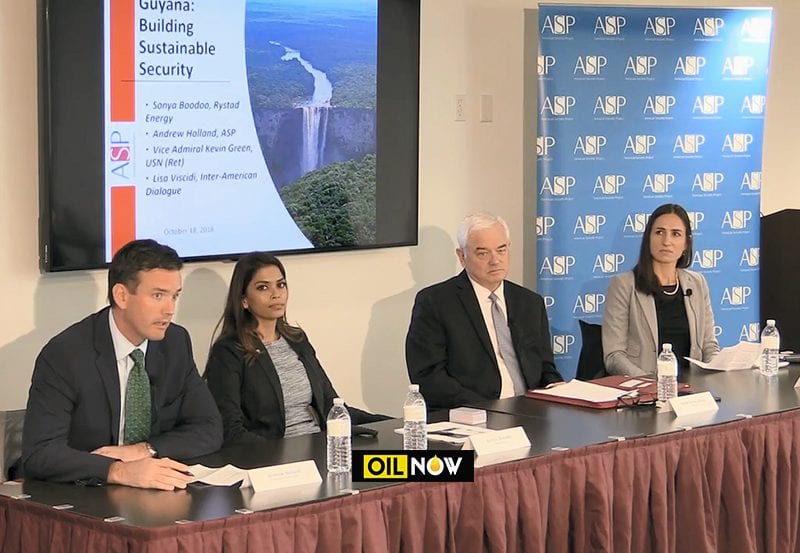No one should pretend that just because Guyana found oil and will profit from its extraction that its history, divided politics, and geopolitical challenges are gone, says the American Security Project (ASP). On the other hand, no one should pronounce an entire nation as “cursed” before the revenues begin to flow either. ASP believes that if managed effectively, Guyana’s new-found wealth could help it to become a linchpin of stability for the greater Caribbean Basin.
ASP led a discussion on Thursday, October 18 in Washington, DC on the geopolitical challenges and opportunities presented by Guyana’s coming oil boom and why American policymakers should be interested in what is unfolding in the lone English-speaking country on the South American continent.
The organization also released a report at the event titled – Guyana: Building Sustainable Security. According to the report, seen by OilNOW, ASP believes that oil production, and the revenues it will generate, will transform the country and the region, particularly with the worsening crisis in neighbouring Venezuela.
“As chaos continues to grow in its neighbor Venezuela, a growing and more prosperous Guyana could become a linchpin of stability for the greater Caribbean Basin. If properly managed, these new resources could help Guyana become a model for how to build sustainable security and prosperity,” the report, written by ASP’s Chief Operating Officer, Andrew Holland, stated.
ASP said for too long, US policy has ignored the interests of the Caribbean and Latin America—seeing it only as a source of problems. The organization believes that American policymakers should build a closer relationship with Guyana to ensure sustainable, long-term security.
“Guyana appears to be engaging in the critical, long range process of preparing for oil resources,” ASP observed, but pointed out that political pressures will increase as a Presidential election approaches in 2020. “Certainly, plans for how to develop and use their resources will be a part of that debate – as is appropriate for a sovereign, democratic nation. Guyana’s neighbors should not interfere with this process,” ASP stated.
The United States, it said, has a clear stake in the success of Guyana – both as a potential customer for its oil production, but more importantly because the U.S. needs the Caribbean – the third border – to become safer and more secure. “The U.S. does not need more instability to its South,” ASP warned in the report.
There is no time to waste, the organization said. “First oil is currently scheduled for early 2020. Once production has started, the government of Guyana should have the policies in place for how to collect and distribute revenue. Should that timeline slip, due to uncertainty about regulations or contract disputes, it becomes more likely that oil production gets caught in domestic and international politics.”
ASP believes that Guyana will have an important role to play in the future of the Caribbean, and South America as well. “As a member of CARICOM and the host of the 15-member organization’s Secretariat in Georgetown, it is well positioned to show leadership to the Caribbean. As the only English-speaking country in South America, it can act as a critical bridge to the United State,” the report said.
By being at the center of some of the most important and pristine ecological regions – the Amazon rainforest and the Guiana Shield – ASP said Guyana can become a model for how to balance economic growth with sustainability and environmental conservation. “The people of Guyana, the report stated, have an opportunity to define their future, and if they are able to succeed, they can share their example with the other small, dependent, insecure nations. “It is an end worth working for,” the organization said.
ASP is a nonpartisan organization created to educate the American public and the world about the changing nature of national security in the 21st Century. It brings together prominent American business leaders, former members of Congress, retired military flag officers, and prominent former government officials.
Presenters at Thursday’s event included Andrew Holland, Vice Admiral Kevin Green – ASP advisor, Sonya Boodoo – Senior Analyst at Rystad Energy and Lisa Viscidi – Director of the Energy, Climate Change and Extractive Industries Programme at the Inter-American dialogue.



